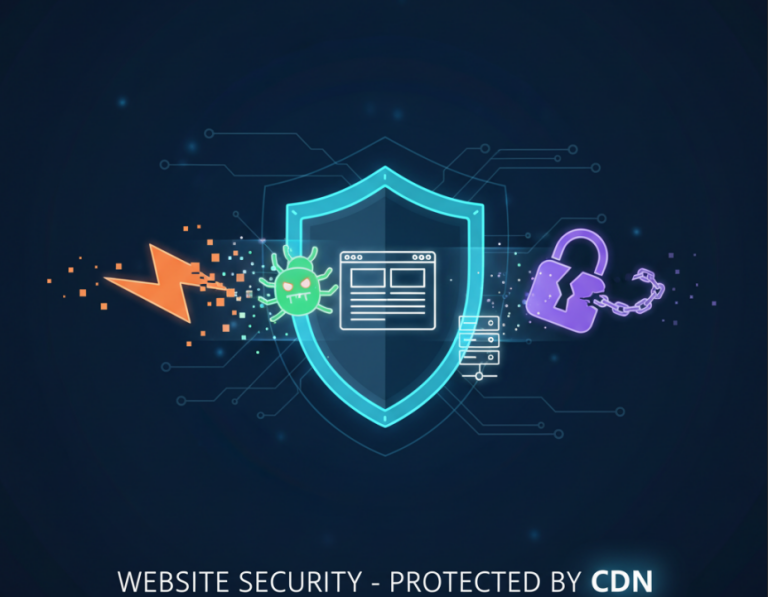
t feels like a trick question, doesn't it? When you think of a Content Delivery Network, your mind immediately goes to one thing: speed. We've been told for years that the purpose of a CDN is to make websites load faster by putting content closer to users. And that's absolutely true. But what if I told you that the real, transformative power of a high-performance CDN isn't just about speed? What if its most critical role—especially in today's unpredictable digital landscape—is about security? It’s a sudden realization that flips the script on everything you thought you knew about content delivery. The speed is a fantastic benefit, but the security? That's what protects your business from the chaos lurking just beneath the surface.
Let’s be honest. Building a successful online business is like building a beautiful house. You spend countless hours perfecting the design, filling it with wonderful products, and making sure the interior looks amazing. You want everyone to come visit. But what if your house has no locks on the doors, no alarms on the windows, and no fence around the property? You wouldn't dream of living that way in the real world, yet many online businesses do just that. They focus entirely on aesthetics and speed, completely overlooking the security vulnerabilities that could bring the whole thing crashing down.
So, how does a CDN act as your digital security system? It’s far more than just a single tool; it’s a multi-layered defense that works silently in the background. Instead of a single, flimsy lock, a high-performance CDN provides an entire fortress of protection. Let's dig into five of the most critical security features that every serious business needs.
Feature 1: The Floodgate for the Digital Storm - DDoS Mitigation
Have you ever imagined a thousand people showing up at your small storefront all at once, not to buy anything, but just to block the entrance and keep real customers from getting in? That's what a DDoS (Distributed Denial of Service) attack feels like. Malicious actors use a network of compromised computers to flood your server with so many fake requests that it simply can't handle the traffic. Your website slows to a crawl or, worse, crashes completely. The legitimate customers you worked so hard to attract can’t get through, and your business is effectively shut down.
A CDN with robust DDoS mitigation acts as a massive digital floodgate. When a storm of malicious traffic starts heading your way, the CDN's global network of servers—called Points of Presence or PoPs—absorbs the attack. Instead of all that traffic hitting your single origin server (your "storefront"), it's distributed across a global network of powerful machines. The CDN intelligently analyzes the traffic in real-time, sifting through the noise to distinguish the good requests from the bad. It discards the junk and allows the real customers to pass through to your site, completely unaware that a digital war is being fought on their behalf. This isn't just about protection; it's about business continuity. Can you afford to be offline for hours or even days during a major sales event? This feature is your insurance policy.
Feature 2: The Bouncer at the Door - Web Application Firewall (WAF)
Think of a WAF as the smart, vigilant bouncer standing at the entrance of your exclusive digital club. While DDoS protection handles the sheer volume of attacks, a WAF is focused on the quality and nature of the threats trying to sneak past. It's designed to protect your web application from specific, more sophisticated attacks that target vulnerabilities in your code. We're talking about things like SQL injection, cross-site scripting (XSS), and file inclusion attacks. These aren’t just about making your site slow; they're about stealing customer data, defacing your website, or even taking full control of your server.
A high-performance CDN's WAF inspects every single HTTP request before it reaches your server. It uses a set of security rules to identify patterns that match known attack signatures. If a request looks suspicious—maybe it contains code that's trying to trick your database into revealing sensitive information—the WAF will immediately block it. It’s a proactive line of defense that keeps the bad guys out before they even get a chance to knock on your server’s door. For an e-commerce site handling customer details, credit card information, and personal data, a WAF isn't just a luxury; it’s a fundamental requirement for maintaining customer trust and avoiding catastrophic data breaches.
Feature 3: The Identity Check for Bots - Bot Management
Not all website traffic is created equal. In fact, a significant portion of internet traffic is not human at all; it's automated bots. Some bots are good, like search engine crawlers that help index your site. But many are bad—they're scrapers trying to steal your content and pricing data, spammers looking for vulnerabilities, or automated "bots" designed to click on ads to drive up costs.
Effective bot management is a crucial part of a CDN's security arsenal. It works like an advanced lie detector and ID scanner for every visitor. When a request comes in, the bot management system analyzes its behavior, origin, and other characteristics to determine if it's a legitimate user or an automated script. It can challenge suspicious bots with things like CAPTCHA tests or simply block them outright, all without bothering your human visitors. This isn’t just about security; it’s about preserving your site's resources and ensuring your real customers get the best possible experience. Imagine a hundred thousand bots trying to add items to their carts at the same time—it can consume your server resources and slow down the shopping experience for everyone. Bot management puts a stop to that, giving your real customers a smooth and reliable path to checkout.
Feature 4: The Digital Lock and Key - SSL/TLS Encryption
This one might seem obvious, but its implementation is critical. SSL/TLS encryption is the technology that makes your website secure, turning your URL from http to https. It’s a digital lock and key that encrypts all data transmitted between your user's browser and your server, making it unreadable to anyone who might try to intercept it. For an e-commerce site, this is the bare minimum for protecting customer information. But a high-performance CDN makes this process not just possible, but incredibly efficient.
With a CDN, the SSL handshake—the complex process of establishing a secure connection—happens at the CDN's edge server, the one closest to the user. This is a big deal. Instead of the data traveling all the way back to your origin server for encryption and decryption, it's done at the nearest CDN node. This dramatically reduces latency and improves the speed of a secure connection. A good CDN also provides integrated SSL/TLS management, making it easy for you to provision and renew certificates from trusted providers. You don’t have to worry about complex configurations or outdated certificates; the CDN handles the heavy lifting, ensuring your site is always secure and your customers’ data is always protected.
Feature 5: The Content Integrity Check - Caching and Content Security Policies (CSP)
What if a hacker manages to compromise your site and inject malicious code or a virus into your legitimate files? This is a terrifying thought. The hacker's goal might be to steal customer information or redirect users to a fraudulent site. But a CDN can act as an integrity guardian, protecting your users even when your site is under attack.
How? By serving content from its cache. Most of the content on your site—images, CSS, and JavaScript—is static and doesn't change often. The CDN stores a copy of this content on its servers. If a hacker manages to modify the original file on your server, the CDN will often continue to serve the cached, clean version of that file until its cache expires or is manually refreshed. This provides a buffer, giving you time to detect and fix the breach before it can harm your customers.
Additionally, a CDN can help enforce Content Security Policies (CSP), which are an added layer of defense against cross-site scripting (XSS) attacks. A CDN can be configured to add a CSP header to every request, telling the user's browser what sources of content are legitimate. If a hacker tries to inject a malicious script from an unauthorized source, the browser will simply block it. This is a profound shift in security, moving the defense from your server to the user's browser, providing a powerful final barrier.
So, the next time someone tells you a CDN is all about speed, you can tell them that's only half the story. The speed is what you see on the surface, but the real power lies in the intricate, multi-layered security fortress that's working invisibly behind the scenes. Without that protection, all the speed in the world won't save you from a catastrophic security breach. The question you should be asking isn't just, "How fast is my website?" but "How safe is my business?" And the answer to that question, for any serious online business, is found in a high-performance CDN.

